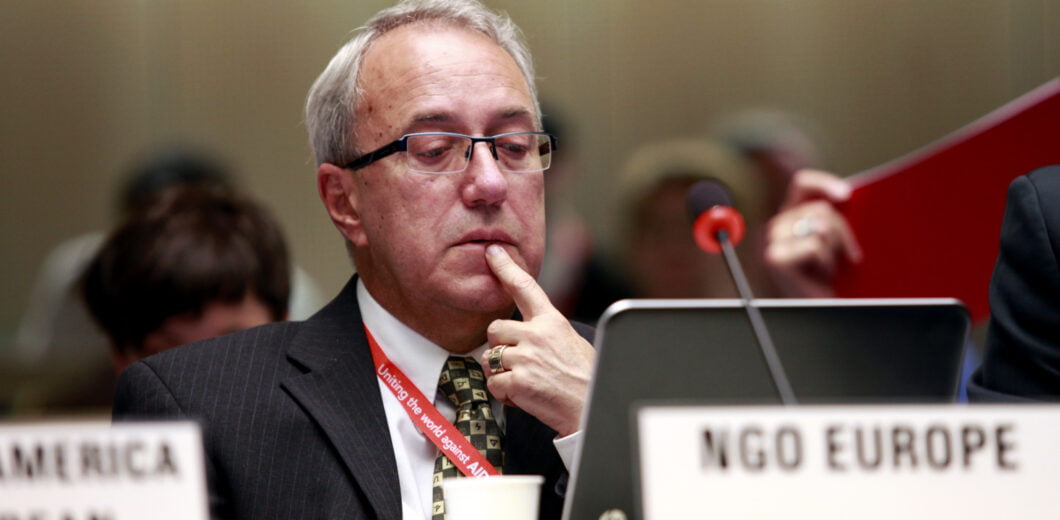Being an NGO delegate gave me a direct experience of global health diplomacy, where simple distinctions between policy and politics don’t apply. I had to quickly move from being the NGO outsider to finding myself very much part of reaching an agreement across significant divides: public health science, national and cultural interests, and a global rights-based approach to health, all within a context of intense multi-stakeholder lobbying and advocacy.
What were some of the highlights for you being part of the UNAIDS PCB NGO delegation?
Being an NGO delegate at the PCB is both exhilarating and exhausting. What makes it worthwhile is knowing that you are contributing even a little to ending AIDS and ensuring health for all. I also enjoyed working on the annual NGO report: they are an opportunity to present the case for a specific civil society priority to get the PCB to make decisions supporting that priority.
I particularly remember the 2014 NGO Report ‘When ‘Rights’ Cause Wrongs: Addressing Intellectual Property Barriers to Ensure Access to Treatment for All People Living with HIV.’ We engaged with the central issue of balancing competing rights, i.e., the right to pharmaceutical patents with the right of populations to health. We definitely had a sense that we were breaking new ground and making significant steps forward.
I also particularly enjoyed my role representing the NGO delegation in external meetings, especially bringing an HIV lens to discussions about the response to humanitarian emergencies. These meetings included ones sponsored by UNHCR and the Inter-Agency Task Team on addressing HIV in Humanitarian Emergencies. I believe the engagement with HIV in humanitarian settings will only increase in importance over the coming years.
What were some of the challenges of the UNAIDS PCB NGO delegation?
The biggest challenge for me was finding a way to compromise with integrity. Moving forward in the PCB setting can be challenging, with so many national and cultural interests in tension. Finding points of consensus and building allies is crucial to advocating at the PCB. This path was difficult as an introvert, but I learned to engage it with gusto over my three years on the NGO delegation.
Related to this is the painful but essential process of finding the correct wording to frame decisions that the PCB can vote on and are most likely to pass. Sometimes, there is a great temptation to elaborate decisions that merely rephrase what has been already agreed upon and decided many times before. To me, this is time-wasting. Sometimes, decisions were couched in vague terms that could mean different things to different audiences.
Decisions must move things onward relative to a particular topic, not simply restate things. It is also a real challenge to ensure accountability about decisions taken: passing new choices at every PCB can be exciting, but the real test is whether they are implemented in a timely way. It is also essential to know when decisions have been successfully implemented and when they have not.
Do you have any recommendations on how civil society, NGOs, key population networks, and organizations can engage more with the UNAIDS PCB?
Attend the PCB as a guest, work with NGO delegates, and make interventions. Support NGO representatives to attend as guests.
Make your interest known to the Communication and Consultation Facility (CCF) of the NGO delegation: get on the delegation’s mailing lists for online meetings before and after PCB meetings and other discussions to support the work of the NGO delegates.
Follow up on PCB decisions with your governments: are decisions being implemented where you are?
Do you have any tips for someone considering joining the UNAIDS PCB?
Make sure you have a network of NGO colleagues across your region to call on for advice and support. You need to be able to speak for more than your own NGO or country but for your region.
Ensure you and your sponsoring NGO appreciate the significant commitment involved in terms of work hours. Ideally, your organization should provide some administrative support, at least occasionally.
Make sure you eat and especially sleep well when you are at the PCB – the days can be hectic, with lots of reading, talking, and long hours of negotiating around the wording of proposed decisions. Save the partying for later!
